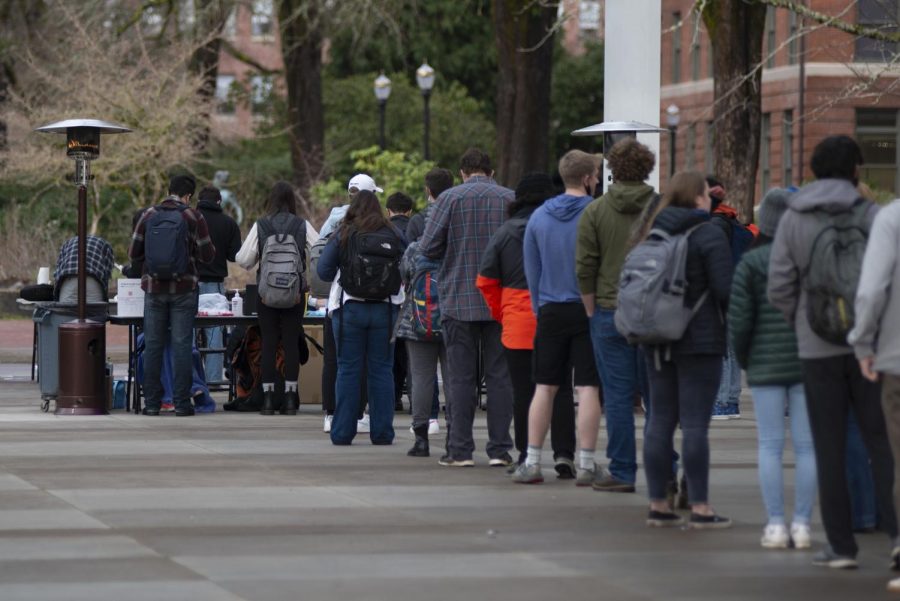Eligible OSU students and employees must receive COVID-19 booster shots by Feb. 15
Oregon State University students line up outside at the Student Experience Center plaza on Jan. 6 to receive COVID-19 testing. Students who are not up-to-date with the university’s vaccination requirements are required to do weekly COVID-19 testing.
January 6, 2022
Eligible Oregon State University students and employees are required to receive their COVID-19 booster shots, and OSU has changed its quarantine requirements to reflect current Oregon Health Authority guidelines.
According to OSU’s Vaccination Requirement Program webpage, students and employees who are eligible to receive their booster must do so by Feb. 15. Students must also upload their up-to-date vaccination records to the Student Health Services’ Patient Portal.
Those who are currently ineligible to receive their booster must do so within 30 days of becoming eligible, according to the website.
According to the Centers for Disease Control and Prevention, individuals who received the Pfizer or Moderna COVID-19 vaccines are eligible for a booster if it has been at least six months since their initial series. Individuals who received the Johnson & Johnson COVID-19 vaccine are eligible if they are 18 years or older and have been vaccinated for at least two months.
Under OSU’s current vaccination program, students and employees must have received at least two doses of the Moderna or Pfizer COVID-19 vaccines or one dose of the Johnson & Johnson COVID-19 vaccine. Students can also apply for a medical or non-medical exemption and test weekly if they do not want to get the COVID-19 vaccine.
The new measure requiring students to receive a third COVID-19 vaccine, or booster shot, is being implemented into OSU’s vaccination program in response to the recent increases in COVID-19 cases.
Data from the university shows that under this current vaccination program, 93% of students are vaccinated against COVID-19, and 99.9% of students are compliant with the vaccination program requirement on OSU campuses including Corvallis, Ore., OSU-Cascades and learning onsite at OSU centers across Oregon in Portland, Newport and LaGrande.
“OSU students and employees have responded remarkably to the university’s vaccination program requirements,” said Steve Clark, the vice president of University Relations and Marketing.
Following guidance from the CDC, OHA, and Local Public Health Authority, OSU has also changed its quarantine requirements for students who test positive for COVID-19.
According to OSU’s quarantine and isolation guidelines, students and employees who are either vaccinated or unvaccinated who test positive for COVID-19 must now only quarantine for at least five days since their symptoms began and until their symptoms are resolved. Students and employees must then wear a “well-fitted” mask for at least ten days after the onset of symptoms when around others.
Vaccinated students who are exposed to COVID-19 are not required to quarantine, but unvaccinated students who are exposed to COVID-19 are required to quarantine for five days, which was changed from the previous ten days.
OSU is supporting local distribution efforts for the COVID-19 vaccine and, according to an email sent to students on Jan. 6, is working with Benton County Health Department and Samaritan Health Services to provide potential booster clinics on OSU’s Corvallis campus in January.
Izabel Raab, a sophomore at OSU, has a parent who works in healthcare in Portland, Ore. and said she has heard about unvaccinated COVID-19 patients who could have prevented getting the virus if they had gotten vaccinated. Raab said she believes in preventative measures, including the booster shot requirement.
In addition, Raab said she visits home throughout the term to spend time with her grandparents and mom.
“Now, knowing that other people have gotten the vaccine and boosters on campus, I feel more sure that I can go home and it would be fine,” Raab said. “I feel really happy that I don’t have to worry about [COVID-19].”




















































































![Newspaper clipping from February 25, 1970 in the Daily Barometer showing an article written by Bob Allen, past Barometer Editor. This article was written to spotlight both the student body’s lack of participation with student government at the time in conjunction with their class representatives response. [It’s important to note ASOSU was not structured identically to today’s standards, likely having a president on behalf of each class work together as one entity as opposed to one president representing all classes.]](https://dailybaro.orangemedianetwork.com/wp-content/uploads/2025/03/Screenshot-2025-03-12-1.00.42-PM-e1741811160853.png)
























